“The melting fuel rods and radiation leaks at Japan’s Fukushima Daiichi nuclear plant are having a direct impact on how nuclear energy is perceived. Many are thinking back to the disasters at Chernobyl and Three Mile Island even while the disaster in Japan presents scenarios never before thought out.
The Chernobyl disaster was a nuclear accident that occurred on 26 April 1986 at the Chernobyl Nuclear Power Plant in the Ukrainian SSR (now Ukraine). It is considered the worst nuclear power plant accident in history, and it is the only one classified as a level 7 event on the International Nuclear Event Scale.
The disaster began during a systems test on 26 April 1986 at reactor number four of the Chernobyl plant, which is near the town of Pripyat. There was a sudden power output surge, and when an emergency shutdown was attempted, a more extreme spike in power output occurred, which led to a reactor vessel rupture and a series of explosions.
This event exposed the graphite moderator components of the reactor to air, causing them to ignite. The resulting fire sent a plume of radioactive fallout into the atmosphere and over an extensive geographical area, including Pripyat. The plume drifted over large parts of the western Soviet Union, Eastern Europe, Western Europe, and Northern Europe. Large areas in Ukraine, Belarus, and Russia were evacuated, and over 336,000 people were resettled. According to official post-Soviet data, about 60% of the fallout landed in Belarus.”
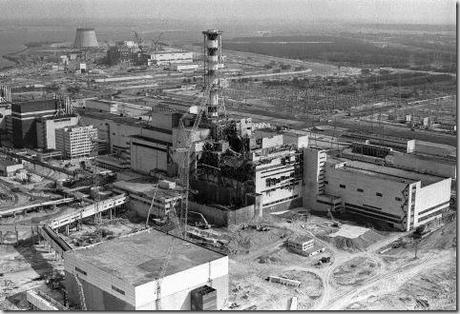 This 1986 aerial view of the Chernobyl nuclear plant in Chernobyl, Ukraine shows damage from an explosion and fire in reactor four on April 26, 1986 that sent large amounts of radioactive material into the atmosphere. Ten years after the world's worst nuclear accident, the plant is still running due to a severe shortage of energy in Ukraine. (AP Photo/ Volodymyr Repik)
This 1986 aerial view of the Chernobyl nuclear plant in Chernobyl, Ukraine shows damage from an explosion and fire in reactor four on April 26, 1986 that sent large amounts of radioactive material into the atmosphere. Ten years after the world's worst nuclear accident, the plant is still running due to a severe shortage of energy in Ukraine. (AP Photo/ Volodymyr Repik)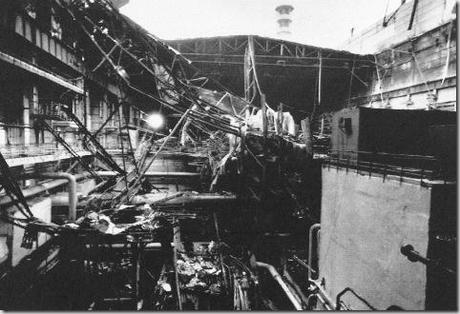 Part of the collapsed roof at the Chernobyl nuclear plant, damaged in a fire, is pictured in this photo taken, Friday, Oct. 13, 1991 in Chernobyl, Ukraine during a media tour of the facility on Sunday. Employees resumed work at the plant on Sunday. (AP Photo/Efrm Lucasky)
Part of the collapsed roof at the Chernobyl nuclear plant, damaged in a fire, is pictured in this photo taken, Friday, Oct. 13, 1991 in Chernobyl, Ukraine during a media tour of the facility on Sunday. Employees resumed work at the plant on Sunday. (AP Photo/Efrm Lucasky)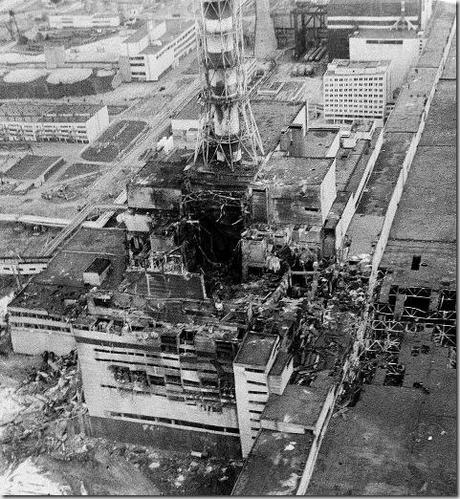 An aerial view of the Chernobyl nucler power plant, the site of the world's worst nuclear accident, is seen in April 1986, made two to three days after the explosion in Chernobyl, Ukraine. In front of the chimney is the destroyed 4th reactor. (AP Photo)
An aerial view of the Chernobyl nucler power plant, the site of the world's worst nuclear accident, is seen in April 1986, made two to three days after the explosion in Chernobyl, Ukraine. In front of the chimney is the destroyed 4th reactor. (AP Photo)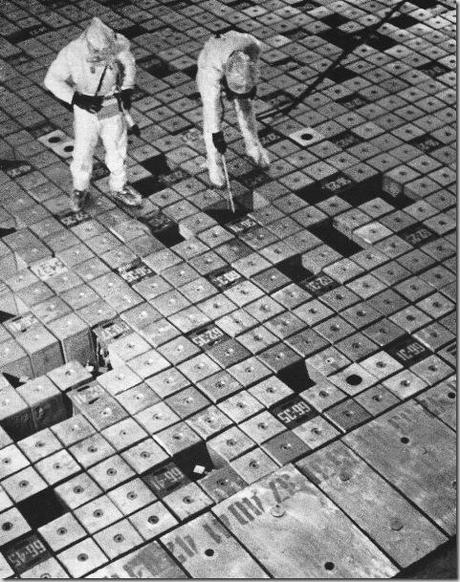 Photo from the February issue of Soviet Life Magazine shows the main hall of the first energy block at the Chernobyl Nuclear Power Plant April 29, 1986 in Chernobyl, Ukraine. The Soviet Union has admitted that an accident has hit the plant, but gave very few details. (AP Photo)
Photo from the February issue of Soviet Life Magazine shows the main hall of the first energy block at the Chernobyl Nuclear Power Plant April 29, 1986 in Chernobyl, Ukraine. The Soviet Union has admitted that an accident has hit the plant, but gave very few details. (AP Photo)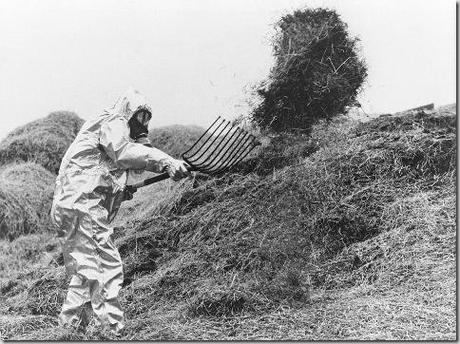 A Swedish farmer removes fallout from hay June 1986, just days after the explosion of reactor No. 4 at the Chernobyl nuclear power plant, the most serious nuclear accident twentieth century. STF/AFP/Getty Images
A Swedish farmer removes fallout from hay June 1986, just days after the explosion of reactor No. 4 at the Chernobyl nuclear power plant, the most serious nuclear accident twentieth century. STF/AFP/Getty Images A Soviet medical technician checks an unidentified child one of the evacuees from the Chernobyl nuclear power plant accident moved to the Kopelovo State Farm in the Ukraine near Kiev, May 11, 1986. This picture was made by a visiting photographed on a trip organized by Soviet officials to show how they are dealing with the accident. (AP Photo/Boris Yurchenko)
A Soviet medical technician checks an unidentified child one of the evacuees from the Chernobyl nuclear power plant accident moved to the Kopelovo State Farm in the Ukraine near Kiev, May 11, 1986. This picture was made by a visiting photographed on a trip organized by Soviet officials to show how they are dealing with the accident. (AP Photo/Boris Yurchenko)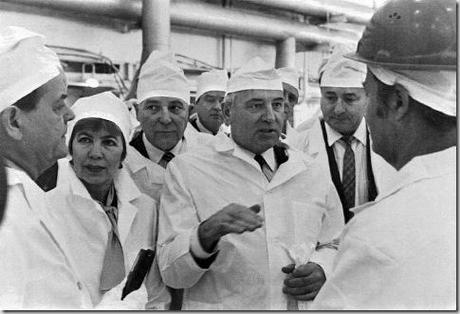 Chairman of the presidium of the USSR Supreme Soviet Mikhail Gorbachev (C) and his wife Raisa Gorbacheva (2nd L) talk with officials of the Chernobyl nuclear power plant on February 23, 1989 during Soviet Leader's first visit to the plant since April 1986 disaster. AFP PHOTO / TASS
Chairman of the presidium of the USSR Supreme Soviet Mikhail Gorbachev (C) and his wife Raisa Gorbacheva (2nd L) talk with officials of the Chernobyl nuclear power plant on February 23, 1989 during Soviet Leader's first visit to the plant since April 1986 disaster. AFP PHOTO / TASS Residents of Kiev line up to get forms filled out prior to radiation checks being performed for everyone possibly exposed to radioactive fallout from the crippled Chernobyl nuclear power plant in Kiev, May 9, 1986. (AP Photo/Boris Yurchenko)
Residents of Kiev line up to get forms filled out prior to radiation checks being performed for everyone possibly exposed to radioactive fallout from the crippled Chernobyl nuclear power plant in Kiev, May 9, 1986. (AP Photo/Boris Yurchenko)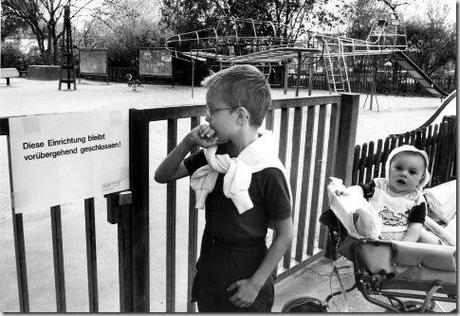 A boy looks at a notice fixed to the locked gate of a playground in Wiesbaden, May 5, 1986, that reads: 'This ground is perliminarily closed'. A week after the atomic reactor explosion in Chernobyl on April 26, 1986, the city council closed all playgrounds after detecting nuclear radiation levels of 124 to 280 Becquerel. (AP Photo/Frank Rumpenhorst)
A boy looks at a notice fixed to the locked gate of a playground in Wiesbaden, May 5, 1986, that reads: 'This ground is perliminarily closed'. A week after the atomic reactor explosion in Chernobyl on April 26, 1986, the city council closed all playgrounds after detecting nuclear radiation levels of 124 to 280 Becquerel. (AP Photo/Frank Rumpenhorst)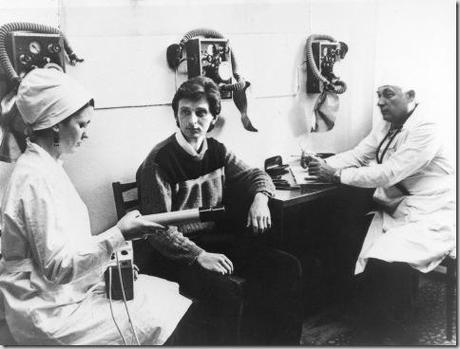 One of the engineers of the Chernobyl nuclear power plant is undergoing tests, May 15, 1986 in the sanatorium Lesnaya Polyana, a few days after the explosion of reactor No. 4 of the Ukrainian nuclear power plants, the most serious nuclear accident. STF/AFP/Getty Images
One of the engineers of the Chernobyl nuclear power plant is undergoing tests, May 15, 1986 in the sanatorium Lesnaya Polyana, a few days after the explosion of reactor No. 4 of the Ukrainian nuclear power plants, the most serious nuclear accident. STF/AFP/Getty Images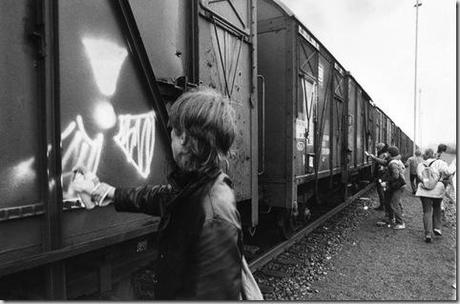 Railroadcars containing contaminated whay powder are marked radioactive by environmental activists in Bremen, North Germany, February 6, 1987. The powder was sent to Bremen for shipment to Egypt. It has been produced after the nuclear disaster of Chernobyl and been contaminated by fallout. (AP Photo/Peter Meyer)
Railroadcars containing contaminated whay powder are marked radioactive by environmental activists in Bremen, North Germany, February 6, 1987. The powder was sent to Bremen for shipment to Egypt. It has been produced after the nuclear disaster of Chernobyl and been contaminated by fallout. (AP Photo/Peter Meyer)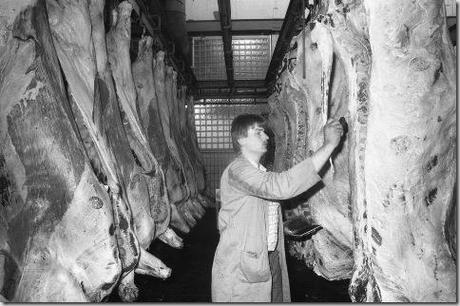 A worker puts a stamp on beef in a slaughterhouse in Frankfurt/Main, Western Germany, on May 12, 1986, declaring it suitable for sale. According to a decision of the Minister for Social Affairs in the state of Hesse, all meat has to be checked for radiation following the recent nuclear accident in Chernobyl, Soviet Union. (AP Photo/Kurt Strumpf/stf)
A worker puts a stamp on beef in a slaughterhouse in Frankfurt/Main, Western Germany, on May 12, 1986, declaring it suitable for sale. According to a decision of the Minister for Social Affairs in the state of Hesse, all meat has to be checked for radiation following the recent nuclear accident in Chernobyl, Soviet Union. (AP Photo/Kurt Strumpf/stf)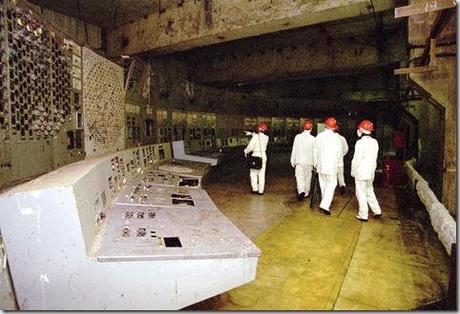 A file photo taken 14 April 1998 shows emloyees at the Chernobyl nuclear power plant walking past a control panel of the destroyed fourth power block of the plant. Ukraine marks 26 April 2006 the 20th anniversary of an accident at the Chernobyl nuclear power plant, which affected millions of people, gobbled up astronomic amount of international funds and remains a grim symbol of hazzards of atomic energy. AFP PHOTO/ GENIA SAVILOV
A file photo taken 14 April 1998 shows emloyees at the Chernobyl nuclear power plant walking past a control panel of the destroyed fourth power block of the plant. Ukraine marks 26 April 2006 the 20th anniversary of an accident at the Chernobyl nuclear power plant, which affected millions of people, gobbled up astronomic amount of international funds and remains a grim symbol of hazzards of atomic energy. AFP PHOTO/ GENIA SAVILOV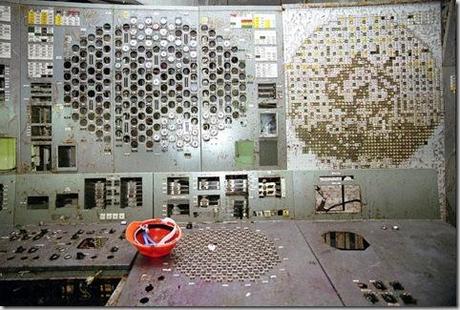 A file photo taken 14 April 1998 shows control panels of the destroyed fourth power block at the Chernobyl nuclear power plant. Ukraine marks 26 April 2006 the 20th anniversary of an accident at the Chernobyl nuclear power plant, which affected millions of people, gobbled up astronomic amount of international funds and remains a grim symbol of hazzards of atomic energy. AFP PHOTO/ GENIA SAVILOV
A file photo taken 14 April 1998 shows control panels of the destroyed fourth power block at the Chernobyl nuclear power plant. Ukraine marks 26 April 2006 the 20th anniversary of an accident at the Chernobyl nuclear power plant, which affected millions of people, gobbled up astronomic amount of international funds and remains a grim symbol of hazzards of atomic energy. AFP PHOTO/ GENIA SAVILOV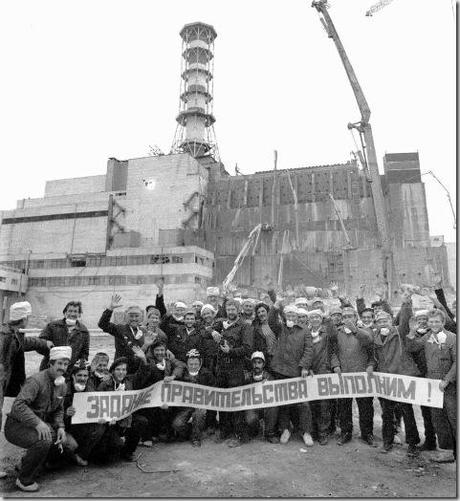 Workers who constructed the cement sarcophagus covering a Chernobyl's reactor, pose with a poster reading: 'We will fulfill the government's order!' in this 1986 file photo next to the uncompleted construction. Thousands of the workers , who took part in the cleanup of Chernobyl have died from the after-effects suffered during the work, according to information from the 'Union-Chernobyl-Ukraine' .(AP Photo/ Volodymyr Repik)
Workers who constructed the cement sarcophagus covering a Chernobyl's reactor, pose with a poster reading: 'We will fulfill the government's order!' in this 1986 file photo next to the uncompleted construction. Thousands of the workers , who took part in the cleanup of Chernobyl have died from the after-effects suffered during the work, according to information from the 'Union-Chernobyl-Ukraine' .(AP Photo/ Volodymyr Repik)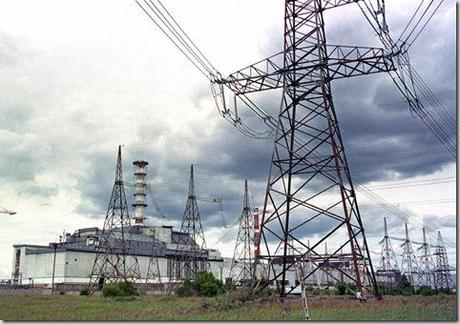 Electric power lines are seen with the Chernobyl nuclear power plant in the background, in this photo taken on June 20, 2000 in Chernobyl, Ukraine. (AP Photo/Efrem Lukatsky)
Electric power lines are seen with the Chernobyl nuclear power plant in the background, in this photo taken on June 20, 2000 in Chernobyl, Ukraine. (AP Photo/Efrem Lukatsky)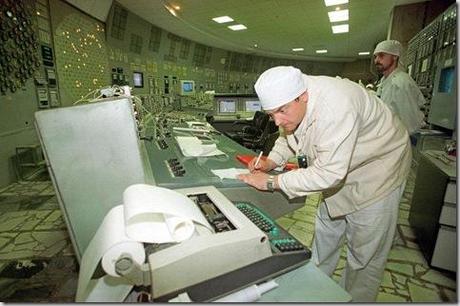 A Ukrainian duty nuclear operator notes control readings at the only working reactor No. 3 site, while his colleague looks on at the Chernobyl Nuclear power plant on Tuesday, June 20, 2000. Andriy Shauman angrily pointed to a switch hidden under a sealed metal lid on the reactor control panel at Chernobyl, the atomic plant whose name is synonymous with nuclear disaster. 'This is the one that will shut down the reactor. For $2,000, I'll let anyone push it when the time comes,' Shauman, Chernobyl's deputy chief engineer. When that time comes on Dec. 15, environmental activists, governments and ordinary people the world over will be relieved. But for the 5,800 workers at Chernobyl, it will be a day of mourning. (AP Photo/Efrem Lukatsky)
A Ukrainian duty nuclear operator notes control readings at the only working reactor No. 3 site, while his colleague looks on at the Chernobyl Nuclear power plant on Tuesday, June 20, 2000. Andriy Shauman angrily pointed to a switch hidden under a sealed metal lid on the reactor control panel at Chernobyl, the atomic plant whose name is synonymous with nuclear disaster. 'This is the one that will shut down the reactor. For $2,000, I'll let anyone push it when the time comes,' Shauman, Chernobyl's deputy chief engineer. When that time comes on Dec. 15, environmental activists, governments and ordinary people the world over will be relieved. But for the 5,800 workers at Chernobyl, it will be a day of mourning. (AP Photo/Efrem Lukatsky)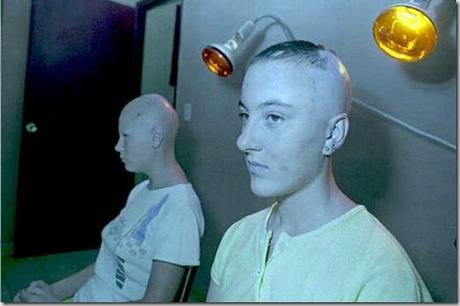 Oxana Gaibon(R),17,and Alla Kozimierka,15, both victims of the 1986 Chernobyl nuclear disaster,receive infrared radiation treatment 12 December at the Tarara Children Hospital in Havana,Cuba. Oxana and Alla,along with hundreds of other contaminated Russian and Ukranian adolescents,have been receiving free medical treatment in Cuba as part of a humanitarian project. ADALBERTO ROQUE/AFP
Oxana Gaibon(R),17,and Alla Kozimierka,15, both victims of the 1986 Chernobyl nuclear disaster,receive infrared radiation treatment 12 December at the Tarara Children Hospital in Havana,Cuba. Oxana and Alla,along with hundreds of other contaminated Russian and Ukranian adolescents,have been receiving free medical treatment in Cuba as part of a humanitarian project. ADALBERTO ROQUE/AFP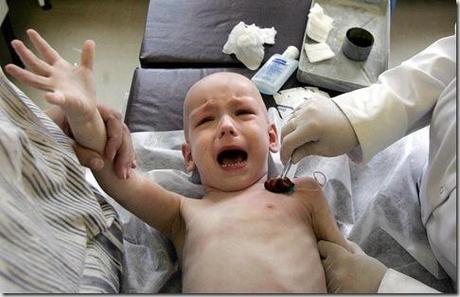 A childcrys as he receives medical attention 18 April 2006 at the childrens hematological and oncological centre in Minsk which was built after the Chernobyl nuclear accident. The Red Cross said today it was facing a major funding shortfall to continue to help people affected by the Chernobyl disaster, despite the attention surrounding the 20th anniversary of the nuclear catastrophe. VIKTOR DRACHEV/AFP/Getty Images
A childcrys as he receives medical attention 18 April 2006 at the childrens hematological and oncological centre in Minsk which was built after the Chernobyl nuclear accident. The Red Cross said today it was facing a major funding shortfall to continue to help people affected by the Chernobyl disaster, despite the attention surrounding the 20th anniversary of the nuclear catastrophe. VIKTOR DRACHEV/AFP/Getty Images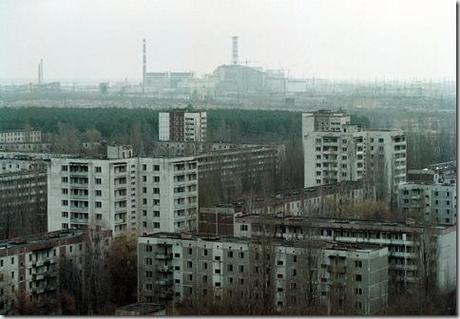 A view of the town of Pripyat and the Chernobyl Fourth Reactor. Chernobyl, the site of the world''s worst nuclear disaster, was closed down for good Friday December 15, 2000. (Photo by Yuri Kozyrev/Newsmakers)
A view of the town of Pripyat and the Chernobyl Fourth Reactor. Chernobyl, the site of the world''s worst nuclear disaster, was closed down for good Friday December 15, 2000. (Photo by Yuri Kozyrev/Newsmakers)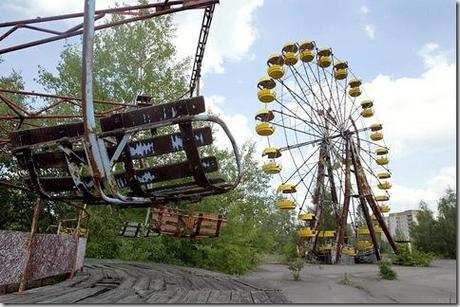 A ferris wheel and a carousel are abandoned 26 May 2003 in the amusement park of the ghost town of Prypyat, adjacent to the Chernobyl nuclear plant. Prypyat which had 45,000 residents was totally evacuated in the first three days after the reactor number four at the Chernobyl plant blew up at 1:23am 26 April 1986, spewing out a radioactive cloud and contaminating much of Europe. An estimated 15,000 to 30,000 people have died in the aftermath. Over 2,5 million Ukranians suffer from health problems related to the Chernobyl blast, with 80,000 of them receiving a pension. AFP PHOTO/ SERGEI SUPINSKY
A ferris wheel and a carousel are abandoned 26 May 2003 in the amusement park of the ghost town of Prypyat, adjacent to the Chernobyl nuclear plant. Prypyat which had 45,000 residents was totally evacuated in the first three days after the reactor number four at the Chernobyl plant blew up at 1:23am 26 April 1986, spewing out a radioactive cloud and contaminating much of Europe. An estimated 15,000 to 30,000 people have died in the aftermath. Over 2,5 million Ukranians suffer from health problems related to the Chernobyl blast, with 80,000 of them receiving a pension. AFP PHOTO/ SERGEI SUPINSKY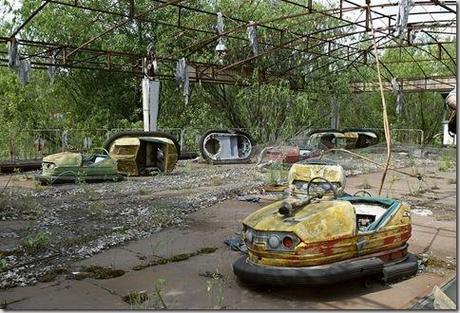 Electrical children's carts are abandoned 26 May 2003 in the amusement park of the ghost town of Prypyat, adjacent to the Prypyat which had 45,000 residents was totally evacuated in the first three days after the reactor number four at the Chernobyl plant blew up at 1:23am 26 April 1986, spewing out a radioactive cloud and contaminating much of Europe. AFP PHOTO/ SERGEI SUPINSKY
Electrical children's carts are abandoned 26 May 2003 in the amusement park of the ghost town of Prypyat, adjacent to the Prypyat which had 45,000 residents was totally evacuated in the first three days after the reactor number four at the Chernobyl plant blew up at 1:23am 26 April 1986, spewing out a radioactive cloud and contaminating much of Europe. AFP PHOTO/ SERGEI SUPINSKY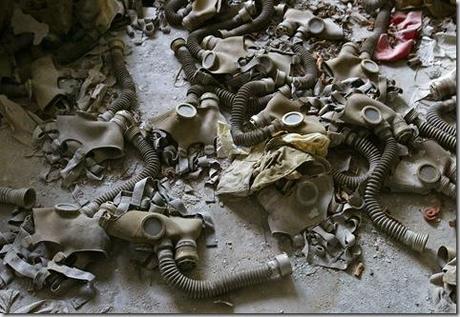 Abandoned gas masks lay on the floor in a class room in a school 26 May 2003 of the deserted town of Prypyat, adjacent to the Chernobyl nuclear site. AFP PHOTO/ SERGEI SUPINSKY
Abandoned gas masks lay on the floor in a class room in a school 26 May 2003 of the deserted town of Prypyat, adjacent to the Chernobyl nuclear site. AFP PHOTO/ SERGEI SUPINSKY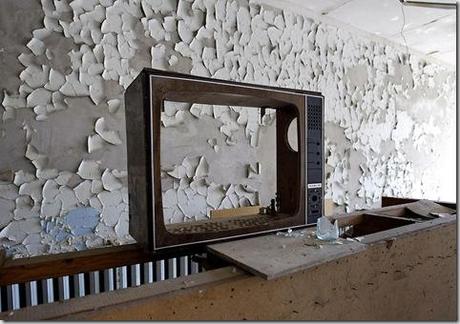 A body of TV receiver sits 26 May 2003 in hotel room in a hotel of the ghost town of Prypyat, adjacent to the Chernobyl nuclear site. AFP PHOTO/ SERGEI SUPINSKY
A body of TV receiver sits 26 May 2003 in hotel room in a hotel of the ghost town of Prypyat, adjacent to the Chernobyl nuclear site. AFP PHOTO/ SERGEI SUPINSKY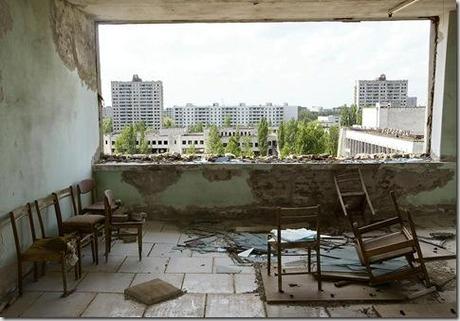 A view taken 26 May 2003 of the ghost town of Prypyat, adjacent to the Chernobyl nuclear site. Prypyat which had 45,000 residents was totally evacuated in the first three days after the reactor number four at the Chernobyl plant blew up at 1:23am 26 April 1986, spewing out a radioactive cloud and contaminating much of Europe. AFP PHOTO/ SERGEI SUPINSKY
A view taken 26 May 2003 of the ghost town of Prypyat, adjacent to the Chernobyl nuclear site. Prypyat which had 45,000 residents was totally evacuated in the first three days after the reactor number four at the Chernobyl plant blew up at 1:23am 26 April 1986, spewing out a radioactive cloud and contaminating much of Europe. AFP PHOTO/ SERGEI SUPINSKY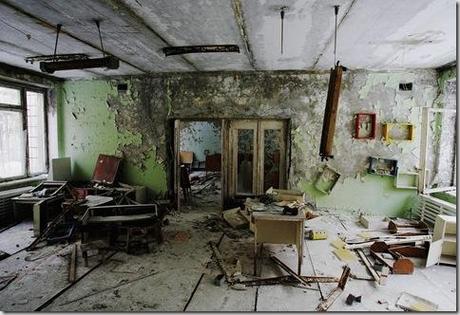 The remnants of an abandoned class room is seen in a pre-school in the deserted town of Pripyat on January 25, 2006 in Chernobyl, Ukraine. Prypyat and the surrounding area will not be safe for human habitation for several centuries. Scientists estimate that the most dangerous radioactive elements will take up to 900 years to decay sufficiently to render the area safe. (Photo by Daniel Berehulak/Getty Images)
The remnants of an abandoned class room is seen in a pre-school in the deserted town of Pripyat on January 25, 2006 in Chernobyl, Ukraine. Prypyat and the surrounding area will not be safe for human habitation for several centuries. Scientists estimate that the most dangerous radioactive elements will take up to 900 years to decay sufficiently to render the area safe. (Photo by Daniel Berehulak/Getty Images)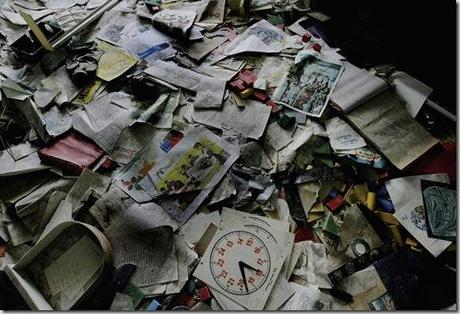 School books and papers in an abandoned pre school in the deserted city of Pripyat on January 25, 2006 in Chernobyl, Ukraine. Prypyat and the surrounding area will not be safe for human habitation for several centuries. Scientists estimate that the most dangerous radioactive elements will take up to 900 years to decay sufficiently to render the area safe. (Photo by Daniel Berehulak/Getty Images)
School books and papers in an abandoned pre school in the deserted city of Pripyat on January 25, 2006 in Chernobyl, Ukraine. Prypyat and the surrounding area will not be safe for human habitation for several centuries. Scientists estimate that the most dangerous radioactive elements will take up to 900 years to decay sufficiently to render the area safe. (Photo by Daniel Berehulak/Getty Images)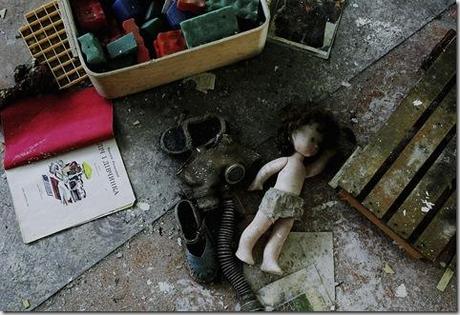 Toys and a gas mask lay in dust in an abandoned pre-school in the deserted city of Pripyat on January 25, 2006 in Chernobyl, Ukraine. (Photo by Daniel Berehulak/Getty Images)
Toys and a gas mask lay in dust in an abandoned pre-school in the deserted city of Pripyat on January 25, 2006 in Chernobyl, Ukraine. (Photo by Daniel Berehulak/Getty Images)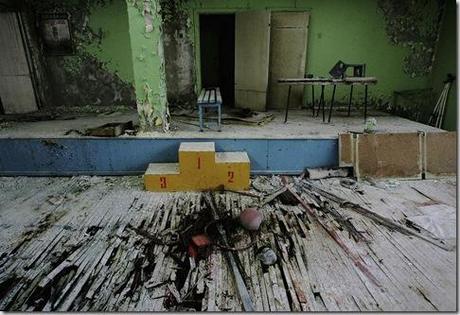 A podium lays in the middle of an abandoned school gymnasium in the city of Pripyat on January 25, 2006 near Chernobyl, Ukraine.Prypyat and the surrounding area will not be safe for human habitation for several centuries. Scientists estimate that the most dangerous radioactive elements will take up to 900 years to decay sufficiently to render the area safe. (Photo by Daniel Berehulak/Getty Images)
A podium lays in the middle of an abandoned school gymnasium in the city of Pripyat on January 25, 2006 near Chernobyl, Ukraine.Prypyat and the surrounding area will not be safe for human habitation for several centuries. Scientists estimate that the most dangerous radioactive elements will take up to 900 years to decay sufficiently to render the area safe. (Photo by Daniel Berehulak/Getty Images)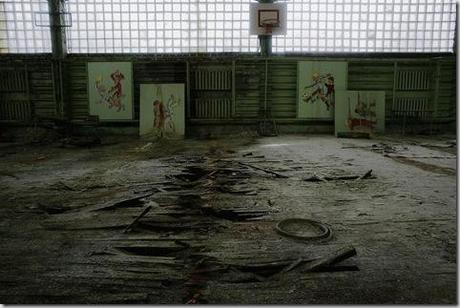 The remains of a school gymnasium is seen in the deserted town of Pripyat on January 25, 2006 near Chernobyl, Ukraine. (Photo by Daniel Berehulak/Getty Images)
The remains of a school gymnasium is seen in the deserted town of Pripyat on January 25, 2006 near Chernobyl, Ukraine. (Photo by Daniel Berehulak/Getty Images)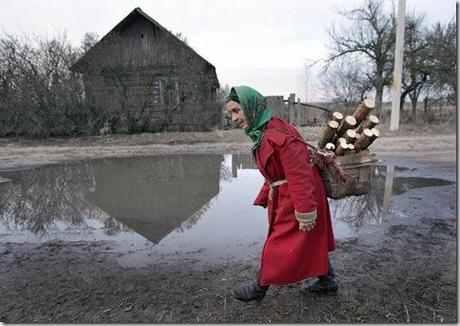 A local resident walks in the Belarussian village of Novoselki, just outside the 30km exclusion zone around the Chernobyl nuclear reactor, 07 April 2006. The 1986 Chernobyl disaster severely contaminated one quarter of Belarus' territory and tens of thousands of people were evacuated from their homes as radiation from Chernobyl spread throughout the area in April 1986. The 20th anniversary of the Chernobyl accident falls on 26 April 2006. AFP PHOTO / VIKTOR DRACHEV
A local resident walks in the Belarussian village of Novoselki, just outside the 30km exclusion zone around the Chernobyl nuclear reactor, 07 April 2006. The 1986 Chernobyl disaster severely contaminated one quarter of Belarus' territory and tens of thousands of people were evacuated from their homes as radiation from Chernobyl spread throughout the area in April 1986. The 20th anniversary of the Chernobyl accident falls on 26 April 2006. AFP PHOTO / VIKTOR DRACHEV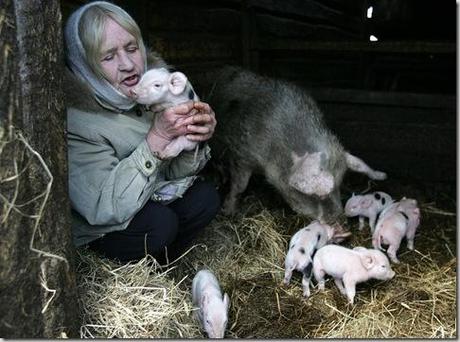 A woman plays with her pigs in the deserted Belarussian village of Tulgovichi, 370 km southeast of Minsk, inside the 30-km exclusion zone around the Chernobyl nuclear reactor, 07 April 2006. AFP PHOTO / VIKTOR DRACHEV
A woman plays with her pigs in the deserted Belarussian village of Tulgovichi, 370 km southeast of Minsk, inside the 30-km exclusion zone around the Chernobyl nuclear reactor, 07 April 2006. AFP PHOTO / VIKTOR DRACHEV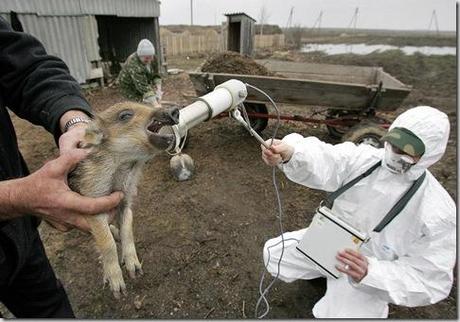 A worker of the Belarussian radiation ecology reserve measures the level of radiation at Belarussian village Vorotets, inside the 30-km exclusion zone around the Chernobyl nuclear reactor, 06 April 2006. VIKTOR DRACHEV/AFP/Getty Images
A worker of the Belarussian radiation ecology reserve measures the level of radiation at Belarussian village Vorotets, inside the 30-km exclusion zone around the Chernobyl nuclear reactor, 06 April 2006. VIKTOR DRACHEV/AFP/Getty Images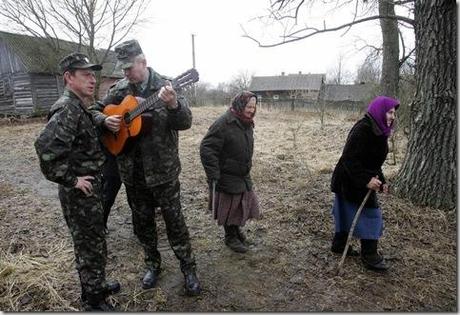 Residents of the Ilyintsy village, a closed zone around the Chernobyl nuclear power plant, about 100 km from Kiev, pass Ukraine Emergencies Ministry rescuers, who rehearse prior to a concert, 05 April, 2006. The rescuers, who are amateur artists, organized the concert ahed of the 20th anniversary of the Chernobyl disaster for more than 330 mostly elderly people who have returned to live illegally in the villages around the power plant, which was the site of the world's worst civillian nuclear disaster in 1986. SERGEI SUPINSKY/AFP/Getty Images
Residents of the Ilyintsy village, a closed zone around the Chernobyl nuclear power plant, about 100 km from Kiev, pass Ukraine Emergencies Ministry rescuers, who rehearse prior to a concert, 05 April, 2006. The rescuers, who are amateur artists, organized the concert ahed of the 20th anniversary of the Chernobyl disaster for more than 330 mostly elderly people who have returned to live illegally in the villages around the power plant, which was the site of the world's worst civillian nuclear disaster in 1986. SERGEI SUPINSKY/AFP/Getty Images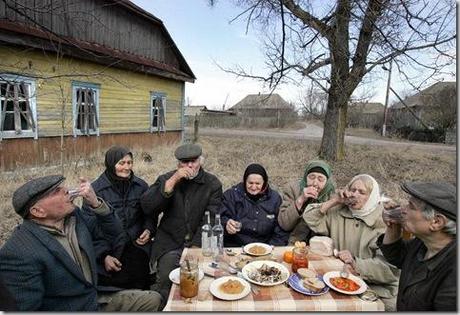 The only villagers of the deserted Belarussian village of Tulgovichi, 370 km southeast of Minsk, inside the 30-km exclusion zone around the Chernobyl nuclear reactor, cellebrate the Orthodox Annunciation, 07 April 2006. Before the accident some 2,000 people lived in the village and now there are only eight people left. One quarter of Belarus' territory was severely contaminated and tens of thousands of people were evacuated from their homes as radiation from Chernobyl spread throughout the area in April 1986. AFP PHOTO / VIKTOR DRACHEV
The only villagers of the deserted Belarussian village of Tulgovichi, 370 km southeast of Minsk, inside the 30-km exclusion zone around the Chernobyl nuclear reactor, cellebrate the Orthodox Annunciation, 07 April 2006. Before the accident some 2,000 people lived in the village and now there are only eight people left. One quarter of Belarus' territory was severely contaminated and tens of thousands of people were evacuated from their homes as radiation from Chernobyl spread throughout the area in April 1986. AFP PHOTO / VIKTOR DRACHEV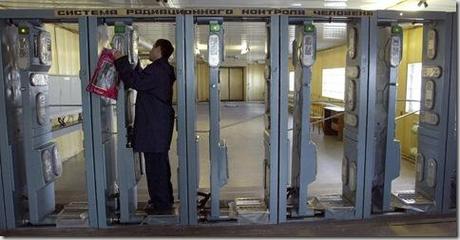 A worker of the Chernobyl nuclear power plant measures the radiation level with a stationary radiation control instrument as he leaves the plant after work 12 April 2006. Ukraine is preparing to mark the 20th anniversary of the Chernobyl disaster 26 April 2006. AFP PHOTO/ GENIA SAVILOV
A worker of the Chernobyl nuclear power plant measures the radiation level with a stationary radiation control instrument as he leaves the plant after work 12 April 2006. Ukraine is preparing to mark the 20th anniversary of the Chernobyl disaster 26 April 2006. AFP PHOTO/ GENIA SAVILOV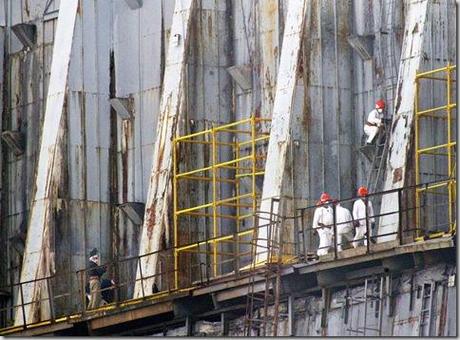 Workers of construction crews, wearing masks and special protective suits, work to strengthen the crumbling "sarcophagus" covering the damaged fourth reactor of the Chernobyl nuclear power plant 12 April, 2006. The crews only work for a few minutes due to the high radiation levels still emanating from the reactor. Ukraine is preparing to mark the 20th anniversary of the Chernobyl disaster 26 April 2006. AFP PHOTO / GENIA SAVILOV
Workers of construction crews, wearing masks and special protective suits, work to strengthen the crumbling "sarcophagus" covering the damaged fourth reactor of the Chernobyl nuclear power plant 12 April, 2006. The crews only work for a few minutes due to the high radiation levels still emanating from the reactor. Ukraine is preparing to mark the 20th anniversary of the Chernobyl disaster 26 April 2006. AFP PHOTO / GENIA SAVILOV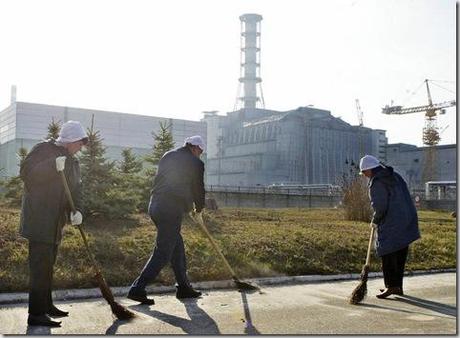 Workers sweep radio-active dust in front of the "sarcophagus" covering the damaged fourth reactor of the Chernobyl nuclear power plant 12 April, 2006. Crews at the site only work for a few minutes due to the high radiation levels still emanating from the reactor. GENIA SAVILOV/AFP/Getty Images
Workers sweep radio-active dust in front of the "sarcophagus" covering the damaged fourth reactor of the Chernobyl nuclear power plant 12 April, 2006. Crews at the site only work for a few minutes due to the high radiation levels still emanating from the reactor. GENIA SAVILOV/AFP/Getty ImagesFonte




